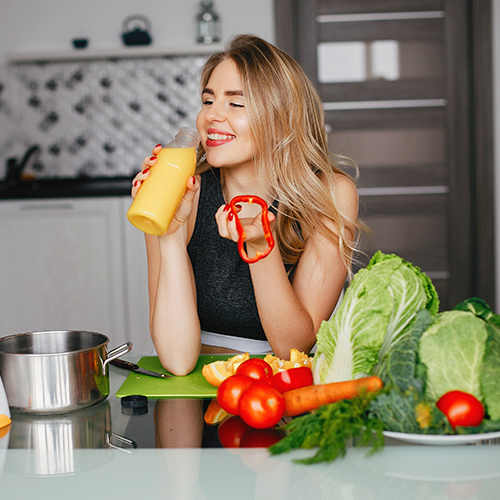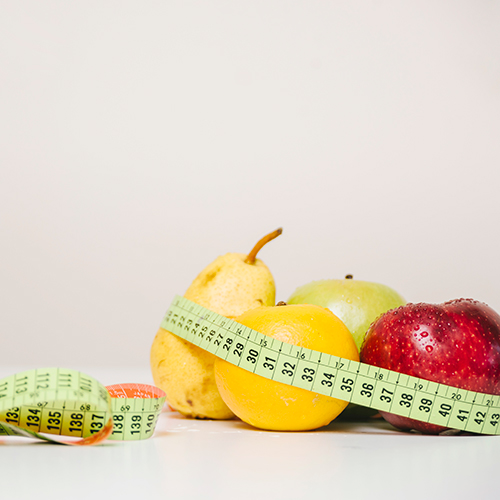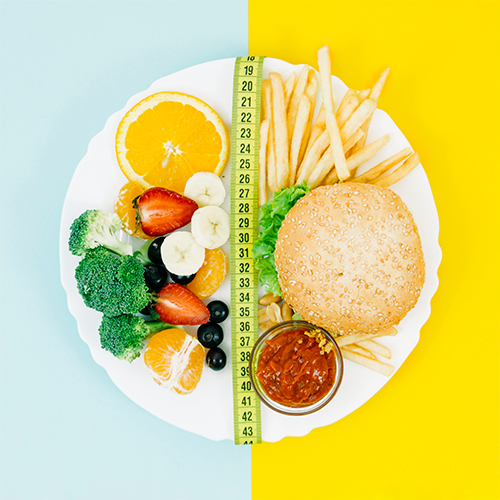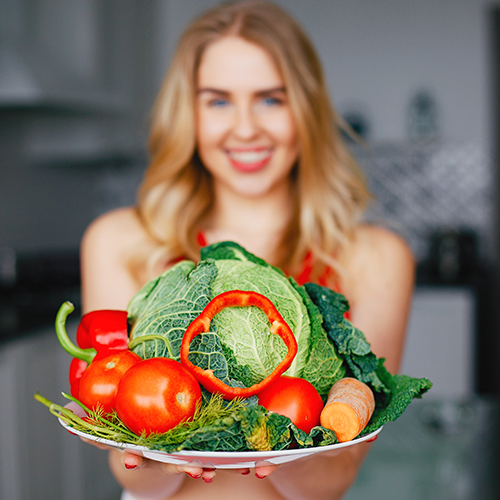We know everyone has lots of questions about weight loss – achieving a healthy weight is one of the top goals of the people we work with. We have a few answers to very common questions below, as well as some resources further down:

The easiest and healthiest diet for weight loss is a whole food plant-based diet. This means a diet composed of unrefined plant foods which includes fruits, vegetables, whole grains, legumes, and small amounts of the richer plant foods such as nuts, seeds, avocado, and olives, but one that eliminates animal products and avoids or eliminates added sugar and added oil. Healthy weight loss occurs gradually and without starvation or deprivation. Eating the high level of fiber in whole plant foods allows for feeling full and satisfied with fewer calories.
No, there are no gimmicks here! Eating well to lose weight means that there is no portion control, no complex points system, and no calorie counting. Most people who start eating a whole food diet are surprised to discover that the weight just melts away without numbers or portions to keep track of, and the process is painless compared to most other methods they’ve tried. A healthy weight loss diet is not a fad but a satisfying plan to sustain you throughout life.
Many people choose to eat a vegetarian diet to lose weight, which might mean avoiding meat and fish, but perhaps including eggs, cheese, and other dairy products. While some find a substantial level of success with a vegetarian diet for weight loss, many people find initial improvements that subsequently plateau. This is often because eggs and dairy products are still relatively calorically dense and do not contain fiber, though they are not meat. A whole food, plant-based diet shares a lot in common with a vegetarian diet, in that both emphasize fruits, vegetables, grains, and legumes. However, keeping eggs, dairy products, and oils in the diet (as many vegetarian recipes do) may eventually pose a roadblock to losing “those last 5 lbs”, even if you make some progress at the beginning.

Vegan diets do not contain animal foods – so the eggs and dairy present in vegetarian diets are gone, which are usually higher in calories than even a low calorie vegetarian diet plan. But vegan diets still may contain processed foods that have added sugar or added oil. Even though vegan diets may emphasize fruits, vegetables, whole grains, and legumes similar to vegetarian diets (and without the animal food) there are plenty of processed foods on the market that are animal-free but still are not good for you.
Picture Oreo cookies, Cap’n Crunch cereal, Ritz crackers, Lays potato chips… uh oh! Switching to a vegan diet can be very helpful for some people because the decision to eat “no animal foods” more clearly draws a line in the sand that can help you steer clear of many foods that hold people back from achieving an ideal weight. However, when you’re feeling tired, tired of saying no, or are faced with food choices at a party, the truth is there are plenty of nutritionally poor choices to make that are still part of a “vegan diet plan”. If you want to achieve vegan weight loss, follow a whole food, plant-based diet with its emphasis on unrefined foods. The best vegan diet for weight loss is simply eating unrefined, plant foods. You will be consuming a nutrient-dense, but less calorie-dense diet that allows you to feel full without overeating.
Yes, it is absolutely possible. Achieving a healthy weight doesn’t happen at the same pace for everybody, and some people need to be a bit more strict than others, or perhaps add in a bit more physical activity, but on the whole, the biggest bang for your buck with weight loss will come from changing what you eat, not exercising. Finding and eliminating the added oils in the diet can go a long way towards cutting calories and healthy weight loss. For people who are finding that even while eating a whole food, plant-based diet they still can’t seem to shed those last few lbs, it may be necessary to cut back or cut out the richer plant-based foods even more. This might mean avoiding nuts, seeds, avocados, or olives.

If your smoothies are made of whole fruits, greens, other whole vegetables, nuts and seeds, and water, you’re going in the right direction! However, sometimes people who are having trouble losing weight do find that after eliminating all animal foods and processed food, the next step to eliminate may be smoothies. It’s worth it to try tweaking your diet if it you have that last five lbs hanging on. If you’ve made all the other changes that you can, but still have a couple lbs to go and you drink smoothies, you could try just eating a breakfast salad with all your smoothie ingredients instead. There’s research suggesting that when fiber is blended very finely and consumed as liquid calories, it doesn’t have the same effect on satiety as intact fiber in unblended or solid food does. This one tweak might only be necessary after you’ve taken all the other steps towards a whole food, plant-based diet plan. In the Sustainable Diet program, we suggest first adding in more whole plant foods, and then moving on to eliminating foods that don’t support your goals. Most people will see results right away with just these two steps.
Many diet programs require that followers accept a certain level of feeling hungry, but a whole food, plant-based diet is does not! If you are eating a diet based mostly or entirely on whole plant foods, the high fiber content in that food will help you feel satiated with less calories, and for longer. However, if you find that you’re still hungry, or feel tired or headachey, that probably means you’re not eating enough food. It’s when you eat more calorie-dense foods like meat, cheese, or processed foods that you need to practice portion control and choose specific serving sizes. However, when you eat whole, plant-foods (and limit your use of nuts/seeds to condiments) it’s not only possible but it’s important to completely fill up every time you eat. This may actually mean your plates of food are bigger than you were used to! Those plates are filled with fiber, more water taking the space of the calories found in animal and processed foods.
All vegetables are the best vegetables for weight loss! There are no magic bullets or super-foods that you must eat . Healthy weight loss happens naturally when eating a whole food, plant-based diet, and can be filled with variety. Because we are used to single solutions or mediations, it’s tempting to ask “should I eat lots of celery?” or “should I focus on radishes?” The approach of looking at your total dietary pattern may take some getting used to, but the effect of nutrition on the body is due to the aggregated and synergistic effect of all the foods consumed by an individual in totality.

If you eat this or that less-than-healthy thing once a year during the holidays it’s unlikely to have a substantial effect on your weight or health, but it also means that if you eat small amounts of brownies, baked goods, potato chips, soda, cheese, or meat on a regular basis, there will be some kind of negative effect on your health that you can’t reverse just by eating lots of a specific food like sweet potatoes or blueberries.
Specific foods don’t act like antidotes to regular consumption of unhealthy foods. It’s the overall dietary pattern that counts! Vegan foods can be fattening if filled with oils or nuts. A vegan weight loss meal plan filled with a variety of colorful vegetables, grains and legumes and whole fruit will likely fill you up and keep you satisfied.
Consuming a whole food, plant-based diet is anti-inflammatory and healing. It allows the body to rebuild a healthy gut and cardiovascular system, process and eliiminate excess cholesterol, limit carcinogens and pathogens and strive for homeostasis and health.
How to eat a plant-based diet: It’s easy to cut through the confusion by simply striving to eat whole, plant foods; not plant parts, like protein, (even plant-based protein), oil, sugar, carbs, etc.
The research on weight loss is really exciting! Adults who eat plant-based diets have lower body mass indexes compared to adults who eat animal foods1, and a whole food, plant-based diet has been shown to help both overweight children2 and adults3 lose weight more easily than other diets, even without regulating portion sizes. Researchers at the University of South Carolina put five different diets to the test to see which one would help people lose the most weight3. The five diets were vegan, vegetarian, pesco-vegetarian (plant foods and fish), semi-vegetarian (light on the animal food) and omnivorous. In this experiment, the vegan diet was essentially a whole food, plant-based diet, because the
meal plan instructions all participants were given focused on low-fat, whole foods. The vegan group lost more weight than the semi-vegetarian, pesco-vegetarian, and omnivorous groups! And
again – remember, they did this without any annoying rules like using points or cards or counting calories!
…Michelle McMacken, MD, talk about weight loss on a plant-based diet. Dr. McMacken is the director of the Bellevue Hospital Weight Management Clinic in New York City, and also one of the physician lecturers in Sustainable Diet! Her full-length lecture here is on weight-loss of course, but if you’d like to get some tips now, check out the clip of this interview she did on what happens when you stop eating animal foods:
For weight loss, the best place to start is with plant-based diet recipes for oil-free salad dressings that you enjoy, as salad dressing is one of the biggest (but most easily eliminated) sources of added oil in the diet. All of the recipes from Sustainable Diet are made of whole, plant foods and are oil-free, but for getting started with cutting a lot of fat out of your diet, the salad dressings are a great first step. Some of our favorites are Raspberry Vinaigrette and classic Thousand Island.
If you’d like a tutorial in plant-based cooking, we’ve got some help for you! Check out our Plant-Based Cooking page where we answer common questions about how to make delicious and tasty food.